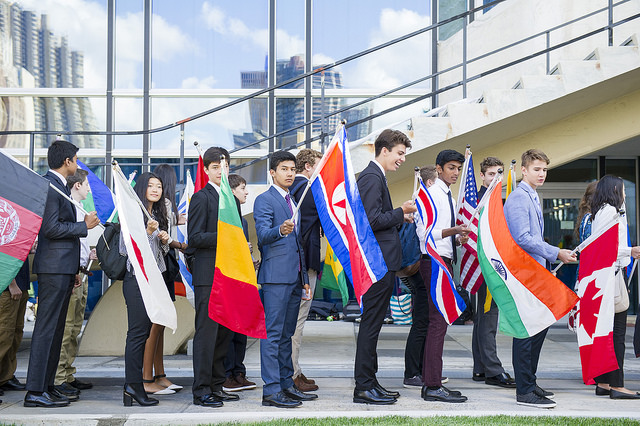Since its creation in 1945, the United Nations has been a beacon of modern human rights activism and global synergy. October 24 marks the 72nd anniversary of the UN Charter’s original signing.
Every year, United Nations Day has an official theme, and for 2017, it’s ‘Potential in Diversity.’ We expect diversity from an organization such as the UN, whose members consist of representatives from its 193 Member States worldwide. However, diversity in the workplace is less prevalent.
The theme of this year’s UN Day offers employers a reminder to prioritize workplace diversity. Despite Title VII of the Civil Rights Act, which protects workers from discrimination based on race, color, national origin, religion, sex, or pregnancy, U.S. American companies still struggle to maximize their potential. Google publicly announced its emphasis on forming a diverse team, but males still outnumber females at Google 3:1, and about 60 percent of employees are white. What’s more, TechCrunch’s two lists of the top 10 tech companies on diversity in gender and race only have 50% overlap, meaning achieving workplace diversity in both gender and race proves difficult.
It’s time that companies seriously prioritize diversity. Those who hire diverse teams reap benefits in various, concrete ways:
- Boost Revenue A 2015 McKinsey report examined proprietary data sets for 366 public companies across various industries in Canada, Latin America, the United Kingdom, and the United States. The study found a correlation between companies with greater board diversity in race and gender and higher financial returns. Gender diverse companies were 15 percent more likely to outperform their national industry medians, and ethnically diverse companies rose the bar to 35 percent. The researchers also found a linear relationship between racial and ethnic diversity and higher financial performance: every 10 percent increase in diversity on executive teams in the U.S. correlated with a 0.8 percent boost in earnings before interest and taxes.
- Sharpen Minds Diverse teams are incentivised to work smarter. Studies show that people who work with heterogeneous teams are more likely to remain objective and continually reevaluate facts. Employees whose coworkers are ethnically and sexualy diverse are likely to become more aware of any personal biases and begin to challenge those biases rather than reinforce them. Researchers at Tufts University created mock juries–some all-white, and others a mix of black and white people. The diverse juries had longer and more expansive deliberations, made less factual errors when discussing, and were more likely to correctly identify guilt or innocence.
- Spur Innovation A Forbes’ report shows that most executives believe diversity encourages different perspectives which foster innovation. Breaking up homogeneity prevents teams from falling victim to “group think,” when members of a team value harmony over accuracy and bolster one another’s misconceptions. In today’s competitive hiring field, diversity also boosts competitiveness for talent. Having various cultural backgrounds in the office both challenges preconceived notions and sparks new ways of thinking.
Diversity offers many organizational benefits, but hiring a diverse team is just the first step. Consider implementing inclusivity trainings or diversity workshops to maximize what your diverse team can achieve together. Happy UN Day–let’s work together to maximize Potential in Diversity.
Sharon Schweitzer and Emilie Lostracco co-wrote this post. Sharon Schweitzer, J.D., is a cross-cultural trainer, modern manners expert, and the founder of Access to Culture. In addition to her accreditation in intercultural management from the HOFSTEDE centre, she serves as a Chinese Ceremonial Dining Etiquette Specialist in the documentary series Confucius was a Foodie, on Nat Geo People. She is the resident etiquette expert on two popular lifestyle shows: ABC Tampa Bay’s Morning Blend and CBS Austin’s We Are Austin. She is regularly quoted by BBC Capital, Investor’s Business Daily, Fortune, and the National Business Journals. Her Amazon #1 Best Selling book in International Business, Access to Asia: Your Multicultural Business Guide, now in its third printing, was named to Kirkus Reviews’ Best Books of 2015. She’s a winner of the British Airways International Trade Award at the 2016 Greater Austin Business Awards.
Emilie Lostracco is a Fall 2017 Cross-Cultural Communication Intern with Access to Culture. The Montreal native is currently a senior at the University of Texas at Austin, studying International Relations and Global Studies. Emilie specializes in international environmental efforts, European studies, and French. She plans on graduating with honors in December. Connect with her via Linkedin.
Photo credit: Rick Bajornas on Flickr


Leave A Comment